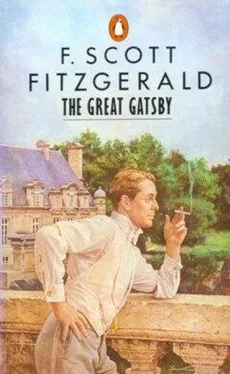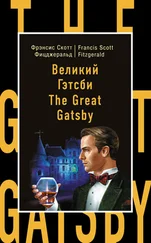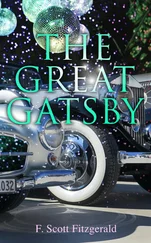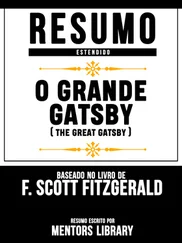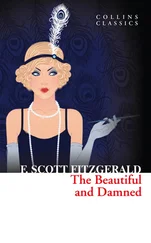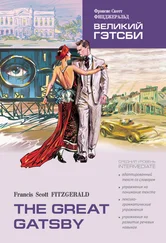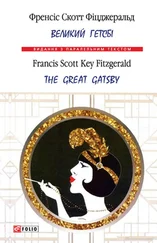Francis Fitzgerald - The Great Gatsby
Здесь есть возможность читать онлайн «Francis Fitzgerald - The Great Gatsby» — ознакомительный отрывок электронной книги совершенно бесплатно, а после прочтения отрывка купить полную версию. В некоторых случаях можно слушать аудио, скачать через торрент в формате fb2 и присутствует краткое содержание. Жанр: Классическая проза, на английском языке. Описание произведения, (предисловие) а так же отзывы посетителей доступны на портале библиотеки ЛибКат.
- Название:The Great Gatsby
- Автор:
- Жанр:
- Год:неизвестен
- ISBN:нет данных
- Рейтинг книги:5 / 5. Голосов: 1
-
Избранное:Добавить в избранное
- Отзывы:
-
Ваша оценка:
- 100
- 1
- 2
- 3
- 4
- 5
The Great Gatsby: краткое содержание, описание и аннотация
Предлагаем к чтению аннотацию, описание, краткое содержание или предисловие (зависит от того, что написал сам автор книги «The Great Gatsby»). Если вы не нашли необходимую информацию о книге — напишите в комментариях, мы постараемся отыскать её.
The Great Gatsby — читать онлайн ознакомительный отрывок
Ниже представлен текст книги, разбитый по страницам. Система сохранения места последней прочитанной страницы, позволяет с удобством читать онлайн бесплатно книгу «The Great Gatsby», без необходимости каждый раз заново искать на чём Вы остановились. Поставьте закладку, и сможете в любой момент перейти на страницу, на которой закончили чтение.
Интервал:
Закладка:
As soon as I arrived I made an attempt to find my host, but the two or three people of whom I asked his whereabouts stared at me in such an amazed way, and denied so vehemently any knowledge of his movements, that I slunk off in the direction of the cocktail table—the only place in the garden where a single man could linger without looking purposeless and alone.
I was on my way to get roaring drunk from sheer embarrassment when Jordan Baker came out of the house and stood at the head of the marble steps, leaning a little backward and looking with contemptuous interest down into the garden.
Welcome or not, I found it necessary to attach myself to some one before I should begin to address cordial remarks to the passers-by.
“Hello!” I roared, advancing toward her. My voice seemed unnaturally loud across the garden.
“I thought you might be here,” she responded absently as I came up. “I remembered you lived next door to—”
She held my hand impersonally, as a promise that she’d take care of me in a minute, and gave ear to two girls in twin yellow dresses, who stopped at the foot of the steps.
“Hello!” they cried together. “Sorry you didn’t win.”
That was for the golf tournament. She had lost in the finals the week before.
“You don’t know who we are,” said one of the girls in yellow, “but we met you here about a month ago.”
“You’ve dyed your hair since then,” remarked Jordan, and I started, but the girls had moved casually on and her remark was addressed to the premature moon, produced like the supper, no doubt, out of a caterer’s basket. With Jordan’s slender golden arm resting in mine, we descended the steps and sauntered about the garden. A tray of cocktails floated at us through the twilight, and we sat down at a table with the two girls in yellow and three men, each one introduced to us as Mr. Mumble.
“Do you come to these parties often?” inquired Jordan of the girl beside her.
“The last one was the one I met you at,” answered the girl, in an alert confident voice. She turned to her companion: “Wasn’t it for you, Lucille?”
It was for Lucille, too.
“I like to come,” Lucille said. “I never care what I do, so I always have a good time. When I was here last I tore my gown on a chair, and he asked me my name and address—inside of a week I got a package from Croirier’s with a new evening gown in it.”
“Did you keep it?” asked Jordan.
“Sure I did. I was going to wear it tonight, but it was too big in the bust and had to be altered. It was gas blue with lavender beads. Two hundred and sixty-five dollars.”
“There’s something funny about a fellow that’ll do a thing like that,” said the other girl eagerly. “He doesn’t want any trouble with anybody.”
“Who doesn’t?” I inquired. “Gatsby. Somebody told me—” The two girls and Jordan leaned together confidentially. “Somebody told me they thought he killed a man once.”
A thrill passed over all of us. The three Mr. Mumbles bent forward and listened eagerly.
“I don’t think it’s so much that, ” argued Lucille sceptically; “it’s more that he was a German spy during the war.”
One of the men nodded in confirmation.
“I heard that from a man who knew all about him, grew up with him in Germany,” he assured us positively.
“Oh, no,” said the first girl. “it couldn’t be that, because he was in the American army during the war.” As our credulity switched back to her she leaned forward with enthusiasm. “You look at him sometimes when he thinks nobody’s looking at him. I’ll bet he killed a man.”
She narrowed her eyes and shivered. Lucille shivered. We all turned and looked around for Gatsby. It was testimony to the romantic speculation he inspired that there were whispers about him from those who had found little that it was necessary to whisper about in this world.
The first supper—there would be another one after midnight—was now being served, and Jordan invited me to join her own party, who were spread around a table on the other side of the garden. There were three married couples and Jordan’s escort, a persistent undergraduate given to violent innuendo, and obviously under the impression that sooner or later Jordan was going to yield him up her person to a greater or lesser degree. Instead of rambling, this party had preserved a dignified homogeneity, and assumed to itself the function of representing the staid nobility of the countryside—East Egg condescending to West Egg, and carefully on guard against its spectroscopic gayety.
“Let’s get out,” whispered Jordan, after a somehow wasteful and inappropriate half-hour; “this is much too polite for me.”
We got up, and she explained that we were going to find the host: I had never met him, she said, and it was making me uneasy. The undergraduate nodded in a cynical, melancholy way.
The bar, where we glanced first, was crowded, but Gatsby was not there. She couldn’t find him from the top of the steps, and he wasn’t on the veranda. On a chance we tried an important-looking door, and walked into a high Gothic library, panelled with carved English oak, and probably transported complete from some ruin overseas.
A stout, middle-aged man, with enormous owl-eyed spectacles, was sitting somewhat drunk on the edge of a great table, staring with unsteady concentration at the shelves of books. As we entered he wheeled excitedly around and examined Jordan from head to foot.
“What do you think?” he demanded impetuously.
“About what?”
He waved his hand toward the book-shelves.
“About that. As a matter of fact you needn’t bother to ascertain. I ascertained. They’re real.”
“The books?”
He nodded.
“Absolutely real—have pages and everything. I thought they’d be a nice durable cardboard. Matter of fact, they’re absolutely real. Pages and—Here! Lemme show you.”
Taking our scepticism for granted, he rushed to the bookcases and returned with Volume One of the “Stoddard Lectures.”
“See!” he cried triumphantly. “It’s a bona-fide piece of printed matter. It fooled me. This fella’s a regular Belasco. It’s a triumph. What thoroughness! What realism! Knew when to stop, too—didn’t cut the pages. But what do you want? What do you expect?”
He snatched the book from me and replaced it hastily on its shelf, muttering that if one brick was removed the whole library was liable to collapse.
“Who brought you?” he demanded. “Or did you just come? I was brought. Most people were brought.”
Jordan looked at him alertly, cheerfully, without answering.
“I was brought by a woman named Roosevelt,” he continued. “Mrs. Claude Roosevelt. Do you know her? I met her somewhere last night. I’ve been drunk for about a week now, and I thought it might sober me up to sit in a library.”
“Has it?”
“A little bit, I think. I can’t tell yet. I’ve only been here an hour. Did I tell you about the books? They’re real. They’re—”
“You told us.”
We shook hands with him gravely and went back outdoors.
There was dancing now on the canvas in the garden; old men pushing young girls backward in eternal graceless circles, superior couples holding each other tortuously, fashionably, and keeping in the corners—and a great number of single girls dancing individualistically or relieving the orchestra for a moment of the burden of the banjo or the traps. By midnight the hilarity had increased. A celebrated tenor had sung in Italian, and a notorious contralto had sung in jazz, and between the numbers people were doing “stunts” all over the garden, while happy, vacuous bursts of laughter rose toward the summer sky. A pair of stage twins, who turned out to be the girls in yellow, did a baby act in costume, and champagne was served in glasses bigger than finger-bowls. The moon had risen higher, and floating in the Sound was a triangle of silver scales, trembling a little to the stiff, tinny drip of the banjoes on the lawn.
Читать дальшеИнтервал:
Закладка:
Похожие книги на «The Great Gatsby»
Представляем Вашему вниманию похожие книги на «The Great Gatsby» списком для выбора. Мы отобрали схожую по названию и смыслу литературу в надежде предоставить читателям больше вариантов отыскать новые, интересные, ещё непрочитанные произведения.
Обсуждение, отзывы о книге «The Great Gatsby» и просто собственные мнения читателей. Оставьте ваши комментарии, напишите, что Вы думаете о произведении, его смысле или главных героях. Укажите что конкретно понравилось, а что нет, и почему Вы так считаете.
